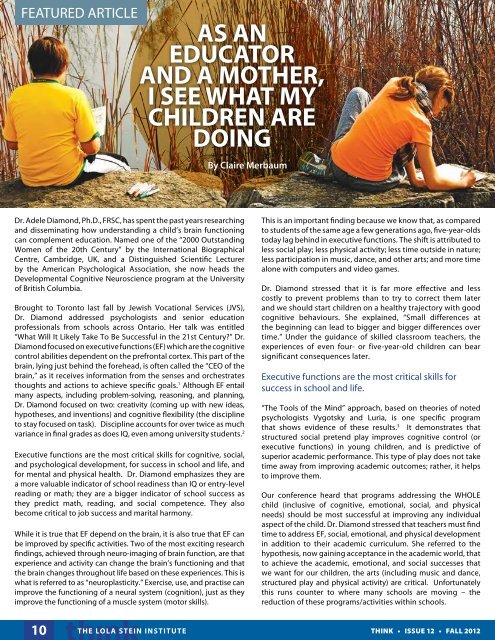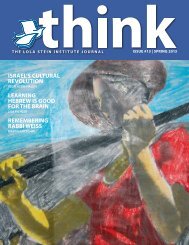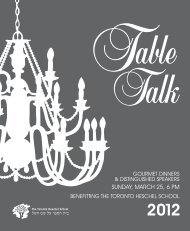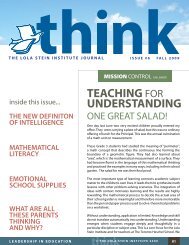Fall 2012 - The Toronto Heschel School
Fall 2012 - The Toronto Heschel School
Fall 2012 - The Toronto Heschel School
Create successful ePaper yourself
Turn your PDF publications into a flip-book with our unique Google optimized e-Paper software.
FEATURED ARTICLE<br />
AS AN<br />
EDUCATOR<br />
AND A MOTHER,<br />
I SEE WHAT MY<br />
CHILDREN ARE<br />
DOING<br />
Dr. Adele Diamond, Ph.D., FRSC, has spent the past years researching<br />
and disseminating how understanding a child’s brain functioning<br />
can complement education. Named one of the “2000 Outstanding<br />
Women of the 20th Century” by the International Biographical<br />
Centre, Cambridge, UK, and a Distinguished Scientific Lecturer<br />
by the American Psychological Association, she now heads the<br />
Developmental Cognitive Neuroscience program at the University<br />
of British Columbia.<br />
Brought to <strong>Toronto</strong> last fall by Jewish Vocational Services (JVS),<br />
Dr. Diamond addressed psychologists and senior education<br />
professionals from schools across Ontario. Her talk was entitled<br />
“What Will It Likely Take To Be Successful in the 21st Century?” Dr.<br />
Diamond focused on executive functions (EF) which are the cognitive<br />
control abilities dependent on the prefrontal cortex. This part of the<br />
brain, lying just behind the forehead, is often called the “CEO of the<br />
brain,” as it receives information from the senses and orchestrates<br />
thoughts and actions to achieve specific goals. 1 Although EF entail<br />
many aspects, including problem-solving, reasoning, and planning,<br />
Dr. Diamond focused on two: creativity (coming up with new ideas,<br />
hypotheses, and inventions) and cognitive flexibility (the discipline<br />
to stay focused on task). Discipline accounts for over twice as much<br />
variance in final grades as does IQ, even among university students. 2<br />
Executive functions are the most critical skills for cognitive, social,<br />
and psychological development, for success in school and life, and<br />
for mental and physical health. Dr. Diamond emphasizes they are<br />
a more valuable indicator of school readiness than IQ or entry-level<br />
reading or math; they are a bigger indicator of school success as<br />
they predict math, reading, and social competence. <strong>The</strong>y also<br />
become critical to job success and marital harmony.<br />
While it is true that EF depend on the brain, it is also true that EF can<br />
be improved by specific activities. Two of the most exciting research<br />
findings, achieved through neuro-imaging of brain function, are that<br />
experience and activity can change the brain’s functioning and that<br />
the brain changes throughout life based on these experiences. This is<br />
what is referred to as “neuroplasticity.” Exercise, use, and practise can<br />
improve the functioning of a neural system (cognition), just as they<br />
improve the functioning of a muscle system (motor skills).<br />
By Claire Merbaum<br />
This is an important finding because we know that, as compared<br />
to students of the same age a few generations ago, five-year-olds<br />
today lag behind in executive functions. <strong>The</strong> shift is attributed to<br />
less social play; less physical activity; less time outside in nature;<br />
less participation in music, dance, and other arts; and more time<br />
alone with computers and video games.<br />
Dr. Diamond stressed that it is far more effective and less<br />
costly to prevent problems than to try to correct them later<br />
and we should start children on a healthy trajectory with good<br />
cognitive behaviours. She explained, “Small differences at<br />
the beginning can lead to bigger and bigger differences over<br />
time.” Under the guidance of skilled classroom teachers, the<br />
experiences of even four- or five-year-old children can bear<br />
significant consequences later.<br />
Executive functions are the most critical skills for<br />
success in school and life.<br />
“<strong>The</strong> Tools of the Mind” approach, based on theories of noted<br />
psychologists Vygotsky and Luria, is one specific program<br />
that shows evidence of these results. 3 It demonstrates that<br />
structured social pretend play improves cognitive control (or<br />
executive functions) in young children, and is predictive of<br />
superior academic performance. This type of play does not take<br />
time away from improving academic outcomes; rather, it helps<br />
to improve them.<br />
Our conference heard that programs addressing the WHOLE<br />
child (inclusive of cognitive, emotional, social, and physical<br />
needs) should be most successful at improving any individual<br />
aspect of the child. Dr. Diamond stressed that teachers must find<br />
time to address EF, social, emotional, and physical development<br />
in addition to their academic curriculum. She referred to the<br />
hypothesis, now gaining acceptance in the academic world, that<br />
to achieve the academic, emotional, and social successes that<br />
we want for our children, the arts (including music and dance,<br />
structured play and physical activity) are critical. Unfortunately<br />
this runs counter to where many schools are moving – the<br />
reduction of these programs/activities within schools.<br />
As the morning concluded, I noticed my fellow participants<br />
shaking their heads as if to say that, even if they agreed with Dr.<br />
Diamond’s recommendations, they had no idea how to integrate<br />
them or to convince principals and teachers of their importance.<br />
Over lunch, I heard, “It’s ideal but is it possible?”<br />
It was at that point that my thoughts turned to <strong>The</strong> <strong>Toronto</strong> <strong>Heschel</strong><br />
<strong>School</strong>, where my children attend. I recalled the numerous times<br />
I have heard Gail Baker, the Head of <strong>School</strong>, and Greg Beiles, now<br />
Lola Stein Director, but still consulting to <strong>Heschel</strong> on curriculum,<br />
speak to these issues and how all these very considerations are<br />
interwoven throughout <strong>The</strong> <strong>Toronto</strong> <strong>Heschel</strong> <strong>School</strong>’s curriculum<br />
as part of the articulated objectives for each grade. I know firsthand<br />
that this is not just “talk.” <strong>The</strong> curriculum units and projects<br />
that I have seen my children engaged in these past four years<br />
provide me with “proof.”<br />
<strong>The</strong> arts are essential to achieve the academic,<br />
emotional, and social successes that we want<br />
for our children.<br />
While most conference participants that day seemed overwhelmed<br />
wondering how they could get their teachers or principals to buy in,<br />
I knew that Gail and Greg spend their time thinking, implementing,<br />
and honing these exact strategies and training their staff in them.<br />
Grounded in Howard Gardner’s theory of multiple intelligence<br />
and Costa and Kallick’s concept of habits of mind, the integrated<br />
<strong>Heschel</strong> curriculum comprehends the importance of developing<br />
and applying executive functions. In a moment, I understood the<br />
incredible value that accrues to my children in attending a school<br />
that focuses on all aspects of their education.<br />
But, it was during the second half of the conference that my “hat”<br />
fully transformed from that of an educator to the hat of a mother<br />
of <strong>Toronto</strong> <strong>Heschel</strong> students. After lunch, Dr. Diamond explained<br />
that brain research indicates that the different parts of a human<br />
being are fundamentally interrelated; we have intellects, but<br />
we also have emotions, bodies, and social needs. That is,<br />
“What nourishes the human spirit may also be best for<br />
executive functions.”<br />
This focus is one of the <strong>Heschel</strong> <strong>School</strong>’s main goals; they<br />
call it “habits of the heart.” Few schools are fortunate<br />
enough to have a head of school like Gail who can<br />
both understand and address emotional needs at the<br />
individual and group level, and who guides teachers<br />
to help reduce children’s stress so that learning can<br />
take place. It is proven that our brains work better<br />
when we are not in a stressed emotional state.<br />
Moreover, the early understanding of <strong>The</strong> <strong>Toronto</strong><br />
<strong>Heschel</strong> <strong>School</strong> founders in 1996 seems almost<br />
visionary: how important it is to include diverse<br />
activities like martial arts and to emphasize use of<br />
the arts to enhance and support students’ learning<br />
experiences. Dr. Diamond concluded her presentation<br />
by pointing out that “even if your goal is only to improve<br />
academic achievement, the best way to achieve that is not<br />
to focus narrowly on academics alone, but to address” the full<br />
spectrum of executive functions.<br />
<strong>The</strong> integrated <strong>Heschel</strong> curriculum comprehends<br />
the importance of developing and applying<br />
executive functions.<br />
As the day closed, I asked Dr. Diamond whether she knew of <strong>The</strong><br />
<strong>Toronto</strong> <strong>Heschel</strong> <strong>School</strong>. She smiled and nodded, and explained<br />
that she had had conversations with Gail Baker, that she knew<br />
how the school taught and how it used programs that accorded<br />
with “evidence-based” principles. She also knew that “Tools of<br />
the Mind” had already been integrated into the <strong>Heschel</strong> school’s<br />
early-years program. For me, this was the ultimate confirmation<br />
that the school my children attend is miles ahead with regard to<br />
both its understanding of my children and its pursuit of academic<br />
excellence.<br />
1 B.J. Casey, R.M. Jones, and T.A. Hare, “<strong>The</strong> Adolescent Brain,” Annals of Academic Science, Vol.<br />
1124 (March 2008): pp. 111–126.<br />
2 A.L. Duckworth and M.E.P. Seligman, “Self-Disciple Outdoes IQ in Predicting Academic<br />
Performance of Adolescents,” Psychological Science, Volume 16, Issue 12 (2005): pp. 939–944.<br />
3 See E. Bodrova and D.J. Leong, Tools of the Mind: <strong>The</strong> Bygotskian Appraoch to Early Childhood<br />
Education, 2nd ed. (New York: Merrill, 2007); and A. Diamond, W.S. Barnett, J. Thomas, and S.<br />
Munro, “Preschool Program Improves Cognitive Control,” Science, Vol. 318, No. 5855 (2007): pp.<br />
1387–1388.<br />
Claire Merbaum, M.A., is Founder and Director of <strong>The</strong> Centre<br />
for Mediated Learning; TCML offers programs enabling children<br />
to become more successful independent learners, as well as<br />
consultations and workshops for educators and parents. Claire is<br />
pursuing a doctorate in Developmental Psychology and Education<br />
at OISE / U of T.<br />
10 think • issue 12 • FALL <strong>2012</strong><br />
11






